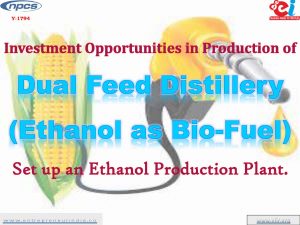
Ethanol is a colourless, pure alcohol derived from a number of biomass feedstocks (the raw materials used to make a product). Because it is derived from biomass, ethanol is a renewable biofuel.
Related Projects:- Alcohol Projects
Agricultural and forestry leftovers such as maize cobs and stocks, rice straw, sawdust, and wood chips can also be used to make ethanol. These feedstocks can be used to make ethanol in a variety of ways. The starch and sugars in corn, sugar cane, and sugar beets are fermented by yeast in the most prevalent ethanol production procedures today.
Start a Business in Africa, Click Here
Highlights:
1. Only 25 of India's 360 distilleries are dual feed distilleries.
2. Dual feed distilleries that produce ethanol from molasses and grain can provide ethanol throughout the year.
Related Project:- Dual Feed Distillery (Ethanol as Bio-Fuel)
3. Ethanol distilleries based on maize and grains (millets and broken rice) may be established in various sections of the country.
4. Rainfed circumstances can be used to grow maize and millets. In comparison to sugarcane, these crops require far less watering.
Start a Business in India, Click Here
Government Approves Bio-Ethanol Procurement:
The Cabinet Committee on Economic Affairs has given its approval to the following pricing for bio-ethanol procurement by Oil Marketing Companies (OMCs) for the Ethanol Blended Petrol (EBP) Program:
1. The mandatory ethanol blending with gasoline of 5%, as previously decided by the CCEA, should be implemented across the country, for which the Ministry of Petroleum & Natural Gas will issue a gazette notification for the OMCs to implement beginning with the 2012-13 sugar season, effective December 1, 2012.
Start a Business in Ethanol Industry, Click Here
2. Ethanol procurement prices will henceforth be determined by OMCs and ethanol providers.
Related Books:- Alcohol And Alcohol Based Industries
3. In the event of a domestic supply shortage, OMCs and chemical firms are free to import ethanol.
It is envisaged that 5% bio-ethanol will be blended with gasoline sold in all of the country's states and territories. The EBP Program is now being implemented in 13 states, with a blending level of around 2% compared to a mandated aim of 5%.
Start a Business in Asia, Click Here
Market Outlook:
In 2019, the worldwide ethanol market was estimated at USD 89.1 billion, with a compound annual growth rate (CAGR) of 4.8 percent expected from 2020 to 2027. The increased use of the product as a biofuel is driving demand for the product. Another key aspect driving market expansion is the increased usage of alcoholic beverages. Both natural and petrochemical feedstocks can be used to make ethanol. Natural sugars are fermented in the presence of yeast in the natural process. Because of the surge in shale gas output, ethylene production is expanding.
Related Videos:- Beverages, Fruit Juice, Alcohol, Wine, Whisky, Mineral Water, Packaged Drinking Water, Beer, Energy Drinks, Hard and Soft Drinks, Alcoholic and Non- Alcoholic
As oil output declines and additional ethylene capacity comes online, the market is projected to become overstocked with ethylene, resulting in ethanol production stagnation. To combat the problem of increased air pollution caused by automobiles, ethanol is combined with gasoline up to quantities of 10% and 15%. Alcoholic beverages containing ethanol, which were once considered a luxury item, are now gradually becoming a need in the majority of households around the world. The entrance of premium products into the market is a major trend that is propelling growth.
Start a Business in Middle East, Click Here
Key Players:
1. A K C Developers Ltd.
2. Bharat Renewable Energy Ltd.
3. Costal Energy Ltd.
4. First Energy Pvt. Ltd.
5. K B K Chem-Engineering Pvt. Ltd.
6. P S A Nitrogen
7. Uttranchal Biodiesel Ltd.
8. Xtraa Cleancities Ltd.
9. Yantra Fintech (India) Ltd.
For More Detail: Click here
#NPCS #entrepreneurindia #Distillery #EthanolDistillery #Ethanol #EthanolMarket #EthanolProduction #EthanolMarketTrends